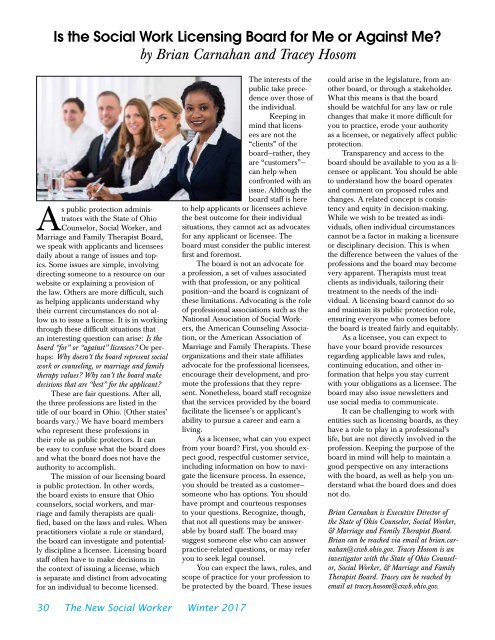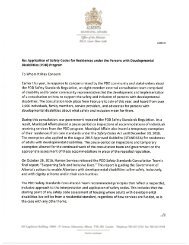In This Issue
click
click
Create successful ePaper yourself
Turn your PDF publications into a flip-book with our unique Google optimized e-Paper software.
Is the Social Work Licensing Board for Me or Against Me?<br />
by Brian Carnahan and Tracey Hosom<br />
As public protection administrators<br />
with the State of Ohio<br />
Counselor, Social Worker, and<br />
Marriage and Family Therapist Board,<br />
we speak with applicants and licensees<br />
daily about a range of issues and topics.<br />
Some issues are simple, involving<br />
directing someone to a resource on our<br />
website or explaining a provision of<br />
the law. Others are more difficult, such<br />
as helping applicants understand why<br />
their current circumstances do not allow<br />
us to issue a license. It is in working<br />
through these difficult situations that<br />
an interesting question can arise: Is the<br />
board “for” or “against” licensees? Or perhaps:<br />
Why doesn’t the board represent social<br />
work or counseling, or marriage and family<br />
therapy values? Why can’t the board make<br />
decisions that are “best” for the applicant?<br />
These are fair questions. After all,<br />
the three professions are listed in the<br />
title of our board in Ohio. (Other states’<br />
boards vary.) We have board members<br />
who represent these professions in<br />
their role as public protectors. It can<br />
be easy to confuse what the board does<br />
and what the board does not have the<br />
authority to accomplish.<br />
The mission of our licensing board<br />
is public protection. <strong>In</strong> other words,<br />
the board exists to ensure that Ohio<br />
counselors, social workers, and marriage<br />
and family therapists are qualified,<br />
based on the laws and rules. When<br />
practitioners violate a rule or standard,<br />
the board can investigate and potentially<br />
discipline a licensee. Licensing board<br />
staff often have to make decisions in<br />
the context of issuing a license, which<br />
is separate and distinct from advocating<br />
for an individual to become licensed.<br />
The interests of the<br />
public take precedence<br />
over those of<br />
the individual.<br />
Keeping in<br />
mind that licensees<br />
are not the<br />
“clients” of the<br />
board—rather, they<br />
are “customers”—<br />
can help when<br />
confronted with an<br />
issue. Although the<br />
board staff is here<br />
to help applicants or licensees achieve<br />
the best outcome for their individual<br />
situations, they cannot act as advocates<br />
for any applicant or licensee. The<br />
board must consider the public interest<br />
first and foremost.<br />
The board is not an advocate for<br />
a profession, a set of values associated<br />
with that profession, or any political<br />
position—and the board is cognizant of<br />
these limitations. Advocating is the role<br />
of professional associations such as the<br />
National Association of Social Workers,<br />
the American Counseling Association,<br />
or the American Association of<br />
Marriage and Family Therapists. These<br />
organizations and their state affiliates<br />
advocate for the professional licensees,<br />
encourage their development, and promote<br />
the professions that they represent.<br />
Nonetheless, board staff recognize<br />
that the services provided by the board<br />
facilitate the licensee’s or applicant’s<br />
ability to pursue a career and earn a<br />
living.<br />
As a licensee, what can you expect<br />
from your board? First, you should expect<br />
good, respectful customer service,<br />
including information on how to navigate<br />
the licensure process. <strong>In</strong> essence,<br />
you should be treated as a customer—<br />
someone who has options. You should<br />
have prompt and courteous responses<br />
to your questions. Recognize, though,<br />
that not all questions may be answerable<br />
by board staff. The board may<br />
suggest someone else who can answer<br />
practice-related questions, or may refer<br />
you to seek legal counsel.<br />
You can expect the laws, rules, and<br />
scope of practice for your profession to<br />
be protected by the board. These issues<br />
could arise in the legislature, from another<br />
board, or through a stakeholder.<br />
What this means is that the board<br />
should be watchful for any law or rule<br />
changes that make it more difficult for<br />
you to practice, erode your authority<br />
as a licensee, or negatively affect public<br />
protection.<br />
Transparency and access to the<br />
board should be available to you as a licensee<br />
or applicant. You should be able<br />
to understand how the board operates<br />
and comment on proposed rules and<br />
changes. A related concept is consistency<br />
and equity in decision-making.<br />
While we wish to be treated as individuals,<br />
often individual circumstances<br />
cannot be a factor in making a licensure<br />
or disciplinary decision. <strong>This</strong> is when<br />
the difference between the values of the<br />
professions and the board may become<br />
very apparent. Therapists must treat<br />
clients as individuals, tailoring their<br />
treatment to the needs of the individual.<br />
A licensing board cannot do so<br />
and maintain its public protection role,<br />
ensuring everyone who comes before<br />
the board is treated fairly and equitably.<br />
As a licensee, you can expect to<br />
have your board provide resources<br />
regarding applicable laws and rules,<br />
continuing education, and other information<br />
that helps you stay current<br />
with your obligations as a licensee. The<br />
board may also issue newsletters and<br />
use social media to communicate.<br />
It can be challenging to work with<br />
entities such as licensing boards, as they<br />
have a role to play in a professional’s<br />
life, but are not directly involved in the<br />
profession. Keeping the purpose of the<br />
board in mind will help to maintain a<br />
good perspective on any interactions<br />
with the board, as well as help you understand<br />
what the board does and does<br />
not do.<br />
Brian Carnahan is Executive Director of<br />
the State of Ohio Counselor, Social Worker,<br />
& Marriage and Family Therapist Board.<br />
Brian can be reached via email at brian.carnahan@cswb.ohio.gov.<br />
Tracey Hosom is an<br />
investigator with the State of Ohio Counselor,<br />
Social Worker, & Marriage and Family<br />
Therapist Board. Tracey can be reached by<br />
email at tracey.hosom@cswb.ohio.gov.<br />
30 The New Social Worker Winter 2017




